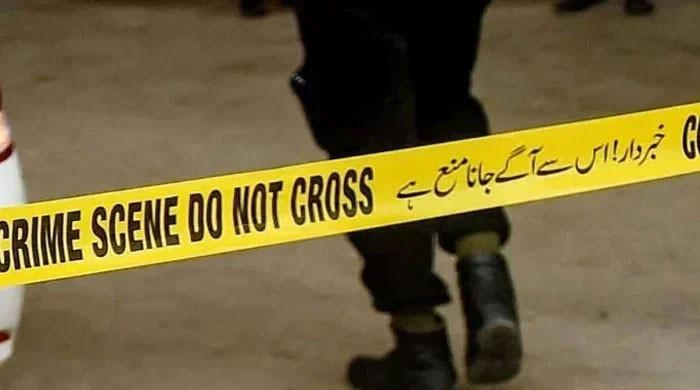WATCH: Teacher thrashing students in Peshawar triggers debate on corporal punishment
NCRC chairperson insists on need for concrete legislation on corporal punishment in Khyber Pakhunkhwa
January 20, 2023

- "Won't tolerate violence against children," says school.
- National Commission on Rights of Child also takes notice.
- Police say they neither received complaint nor watched video.
PESHAWAR: A traumatic video of a teacher beating his students Friday went viral on social media sparking debate over corporal punishment in Pakistan.
In the incident, which has taken place in the Peshawar Model School, a teacher can be seen assaulting his students in a classroom. One of the students appeared standing in a corner, while the other is apparently seated on the desk.
Speaking with Geo News, the school administration has said that it would take action against the teacher. “We will not tolerate violence against children. The incident is under investigation.”
Meanwhile, the Peshawar Police said they had neither watched the viral video nor it came to their notice.
Trigger warning: Some of our readers may find the following content disturbing. Reader discretion is advised.
The police also said that no contact had been made by the parents of the students or their teachers in this regard.
The local police told Geo News that they cannot take any action against the incident "unless a complaint is filed".
Afshan Tehseen, the chairperson of the National Commission on the Rights of Child, has strongly condemned the incident, saying the commission has taken notice of the case.
"We are taking action against the incident. The child protection law in Khyber Pakhtunkhwa covers corporal punishment and a follow-up will be done with the relevant police in this matter," she said while speaking with Geo.tv.
Tehseen added that the existence of law and its implementation to avoid such incidents is important, but "it is also crucial for parents to have awareness regarding such issues".
"Child protection committees should be ensured in schools and parents should also make this demand," the NCRC chairperson stated.
Tehseen, who has worked with agencies of the United Nations in the past, highlighted "there is no specific law that deals with corporal punishment in KP".
"The NCRC has written to the government concerned department twice in the past. We will again follow up on the matter," she said while stressing the need for concrete legislation on the issue.
She added that action against such incidents in KP could only be taken by complainants such as parents or relevant government departments including the commission on the basis of the aspect of corporal punishment mentioned in the child protection law.
Rana Asif Habib, a lawyer who works on child rights and president of the Initiator Human Development Foundation, spoke about the cursory coverage of corporal punishment in KP's child protection law.
"Sindh was the only province to introduce the Prohibition for Corporal Punishment law in 2016, after which legislation was carried out in Azad Jammu and Kashmir, Gilgit Baltistan, and at the federal level," he said while responding to Geo.tv.
Pakistan signed and ratified the United Nations Convention on the Rights of the Child in 1989 on the basis of which the country was supposed to legislate on corporal punishment.
Rana said that the perpetrators in Pakistan are not penalised. Mention of teachers is, in fact, limited to warning, demotion, transfer or suspension which cannot stop physical and mental punishment in schools, he added.
He further said that in the absence of proper redressal, such incidents continue to increase which impacts children's mental and physical growth and development.
Rana said it negates the rights granted to children in the UN convention including their survival, development and participation.
"Children, resultantly, struggle with mental trauma and lose the ability to cope with life's challenges. Corporal punishment also results in increasing the rate of students dropping out of schools," he revealed.
The lawyer added that while the KP government has claimed to protect child rights, it has failed to address the crime of corporal punishment.
"It is important to enforce the UN convention on the rights of children. Legislation should be done on the neglect against corporal punishment so that when children are subjected to it by parents or teachers in schools or madrassahs they should receive harsh punishments," he said.
Rana Asif added the punishment should entail penal servitude and a fine of Rs50,000.












